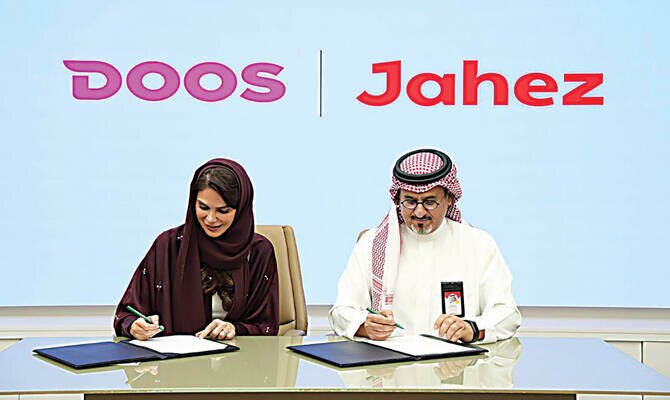
MENA Startup Funding Drops to $784.9m in October Amid Ongoing Investor Confidence
Debt financing dominates as startups raise a total of $784.9 million across the Middle East and North Africa region.
Startup funding in the Middle East and North Africa (MENA) region surged by 395 percent year-over-year in October, signaling sustained investor confidence despite a decline from September's record high, according to Wamda’s monthly report.
The $784.9 million secured across the month represented a 77 percent downturn from the $3.5 billion raised in September.
Debt financing led with $567.8 million—accounting for 72 percent of total funding through four deals—while equity and other investment instruments raised $217 million, highlighting an increasing reliance on debt capital among late-stage and capital-intensive startups.
The United Arab Emirates (UAE) topped the list with $615.7 million across 15 deals, primarily driven by Property Finder's $525 million debt raise.
Saudi Arabia followed with $119.3 million from an equal number of transactions, while Egypt made a notable rebound with $33.3 million raised through five deals—exceeding its entire third-quarter total of $22.3 million from 22 startups.
Morocco continued its momentum with $12.3 million raised through three rounds.
Property technology (prop-tech) emerged as the most funded sector in October, securing $526 million almost entirely from the Property Finder transaction.
Software-as-a-Service (SaaS) startups followed with $60 million, while a single game tech deal brought in $41.6 million.
Fintech, despite having the highest deal count of seven rounds, fell to ninth place by value, raising only $12.5 million.
Early-stage startups dominated investment activity, capturing 32 rounds—including grants and series A—that collectively raised $95.2 million.
Only one series B deal worth $50 million was recorded in October, indicating a slowdown in late-stage capital deployment.
Business-to-consumer (B2C) startups led by funding value, garnering $594.7 million across nine rounds, compared to the $166 million raised by 28 business-to-business (B2B) startups.
Eight startups operated hybrid models blending both consumer and enterprise offerings.
Gender disparities in funding persisted, with male-led startups capturing 93 percent of total funding while female-founded ventures raised only $4.5 million across three deals.
Mixed-gender founding teams secured $51 million, underscoring ongoing gaps in capital access within the ecosystem.
Saudi-based fintech startup Stream has secured $4 million in seed funding to scale its billing and payments automation platform.
The round was led by Outliers VC with participation from BYLD Ventures and several angel investors including Abdullah Elyas, co-founder of Careem.
Founded in 2024 by Ibrahim Al-Dlaigan, Stream provides businesses with tools for automating invoicing, payment scheduling, and reconciliation while offering enhanced visibility and flexible payment options.
The company plans to use the new capital to support product development, compliance enhancements, and improve user experience as it expands its infrastructure to meet growing demand.
AI-driven customer engagement platform Bonat has raised $6 million in a series A funding round led by Tali Ventures, the corporate venture arm of stc group.
Other investors included anb seed Fund, Rua Growth Fund, RZM Investments, and several angel investors.
Founded in 2019 by Saud Binsaeed, Bonat helps merchants convert walk-ins into loyal customers through analytics, behavior-based marketing automation, and digital wallet integrations.
The startup currently serves thousands of retailers and food and beverage brands, connecting with more than six million users.
The funds will be used to accelerate AI product development, enhance personalized campaign automation, and expand operations across Saudi Arabia and the Gulf Cooperation Council (GCC) region.
Tunisian travel tech startup WildyNess has closed an undisclosed pre-seed round co-led by Bridging Angels and the African Diaspora Network.
The funding will support regional growth and technology infrastructure upgrades.
Founded in 2021 by Achraf Aouadi and Rym Bourguiba, WildyNess is a B2B2C platform connecting travelers with local, co-created tourism experiences delivered by micro-entrepreneurs.
The startup plans to expand into Algeria, Saudi Arabia, Oman, and the UAE.
Moroccan superapp ORA Technologies has acquired Cathedis in a move marking the first consolidation between Moroccan startups backed entirely by local capital.
The acquisition strengthens ORA's position within Morocco's digital economy by integrating fintech, logistics, and foodtech services.
Founded in 2023 by Omar Alami, ORA offers an all-in-one platform featuring peer-to-peer payments, e-commerce, on-demand services, social networking, and plans to launch a digital wallet.
In July, ORA completed a $7.5 million series A round led by the Azur Innovation Fund.
Saudi Arabia-based quick-commerce platform Doos has received a strategic investment from Jahez as it expands its service offerings beyond food delivery.
The partnership leverages Jahez's technology infrastructure and Doos’s curated product catalogue and express delivery capabilities to deepen market reach in the Kingdom's fast-growing quick-commerce segment.
Founded in 2023 by Tala Al-Sahsah, Doos operates cloud stores in Jeddah and Riyadh, offering a locally tailored retail experience that includes supermarket staples, fresh produce, beauty products, gifts, and lifestyle items.
The startup plans to scale operations across Saudi Arabia to redefine convenience retail for local households.
Egypt-based venture capital firm DisrupTech Ventures has made its first investment in Morocco by backing Chari, a Y Combinator–backed fintech startup that digitizes informal retail and delivers embedded financial services.
This also marks DisrupTech's second investment in Africa outside of Egypt.
The firm will join Chari’s board of directors to support the company’s regional fintech growth strategy.
Founded in 2020 by Ismael Belkhayat and Sophia Alj, Chari enables small retailers to order fast-moving consumer goods and access financial services.
The investment follows Chari's $12 million series A round closed less than a month ago, led by SPE Capital and Orange Ventures.
Chari also recently obtained a payment institution license from Bank Al-Maghrib, enabling it to issue IBANs and debit cards, process domestic and international transfers, and offer micro-insurance products.
Morocco and Uganda-based venture capital firm First Circle Capital has raised $6 million from the International Finance Corporation (IFC), part of the World Bank Group, to invest in early-stage fintech startups across Africa.
The fund focuses on pre-seed and seed-stage companies addressing gaps in financial inclusion, infrastructure, and digital finance and offers a dual offering of capital and operational support to prepare startups for series A rounds.
First Circle is targeting a total fund size of $30 million and has already backed 15 startups in eight African countries.
The fund reports that 30 percent of its portfolio is led or co-founded by women, and half of its investments operate in more than one market.
The $784.9 million secured across the month represented a 77 percent downturn from the $3.5 billion raised in September.
Debt financing led with $567.8 million—accounting for 72 percent of total funding through four deals—while equity and other investment instruments raised $217 million, highlighting an increasing reliance on debt capital among late-stage and capital-intensive startups.
The United Arab Emirates (UAE) topped the list with $615.7 million across 15 deals, primarily driven by Property Finder's $525 million debt raise.
Saudi Arabia followed with $119.3 million from an equal number of transactions, while Egypt made a notable rebound with $33.3 million raised through five deals—exceeding its entire third-quarter total of $22.3 million from 22 startups.
Morocco continued its momentum with $12.3 million raised through three rounds.
Property technology (prop-tech) emerged as the most funded sector in October, securing $526 million almost entirely from the Property Finder transaction.
Software-as-a-Service (SaaS) startups followed with $60 million, while a single game tech deal brought in $41.6 million.
Fintech, despite having the highest deal count of seven rounds, fell to ninth place by value, raising only $12.5 million.
Early-stage startups dominated investment activity, capturing 32 rounds—including grants and series A—that collectively raised $95.2 million.
Only one series B deal worth $50 million was recorded in October, indicating a slowdown in late-stage capital deployment.
Business-to-consumer (B2C) startups led by funding value, garnering $594.7 million across nine rounds, compared to the $166 million raised by 28 business-to-business (B2B) startups.
Eight startups operated hybrid models blending both consumer and enterprise offerings.
Gender disparities in funding persisted, with male-led startups capturing 93 percent of total funding while female-founded ventures raised only $4.5 million across three deals.
Mixed-gender founding teams secured $51 million, underscoring ongoing gaps in capital access within the ecosystem.
Saudi-based fintech startup Stream has secured $4 million in seed funding to scale its billing and payments automation platform.
The round was led by Outliers VC with participation from BYLD Ventures and several angel investors including Abdullah Elyas, co-founder of Careem.
Founded in 2024 by Ibrahim Al-Dlaigan, Stream provides businesses with tools for automating invoicing, payment scheduling, and reconciliation while offering enhanced visibility and flexible payment options.
The company plans to use the new capital to support product development, compliance enhancements, and improve user experience as it expands its infrastructure to meet growing demand.
AI-driven customer engagement platform Bonat has raised $6 million in a series A funding round led by Tali Ventures, the corporate venture arm of stc group.
Other investors included anb seed Fund, Rua Growth Fund, RZM Investments, and several angel investors.
Founded in 2019 by Saud Binsaeed, Bonat helps merchants convert walk-ins into loyal customers through analytics, behavior-based marketing automation, and digital wallet integrations.
The startup currently serves thousands of retailers and food and beverage brands, connecting with more than six million users.
The funds will be used to accelerate AI product development, enhance personalized campaign automation, and expand operations across Saudi Arabia and the Gulf Cooperation Council (GCC) region.
Tunisian travel tech startup WildyNess has closed an undisclosed pre-seed round co-led by Bridging Angels and the African Diaspora Network.
The funding will support regional growth and technology infrastructure upgrades.
Founded in 2021 by Achraf Aouadi and Rym Bourguiba, WildyNess is a B2B2C platform connecting travelers with local, co-created tourism experiences delivered by micro-entrepreneurs.
The startup plans to expand into Algeria, Saudi Arabia, Oman, and the UAE.
Moroccan superapp ORA Technologies has acquired Cathedis in a move marking the first consolidation between Moroccan startups backed entirely by local capital.
The acquisition strengthens ORA's position within Morocco's digital economy by integrating fintech, logistics, and foodtech services.
Founded in 2023 by Omar Alami, ORA offers an all-in-one platform featuring peer-to-peer payments, e-commerce, on-demand services, social networking, and plans to launch a digital wallet.
In July, ORA completed a $7.5 million series A round led by the Azur Innovation Fund.
Saudi Arabia-based quick-commerce platform Doos has received a strategic investment from Jahez as it expands its service offerings beyond food delivery.
The partnership leverages Jahez's technology infrastructure and Doos’s curated product catalogue and express delivery capabilities to deepen market reach in the Kingdom's fast-growing quick-commerce segment.
Founded in 2023 by Tala Al-Sahsah, Doos operates cloud stores in Jeddah and Riyadh, offering a locally tailored retail experience that includes supermarket staples, fresh produce, beauty products, gifts, and lifestyle items.
The startup plans to scale operations across Saudi Arabia to redefine convenience retail for local households.
Egypt-based venture capital firm DisrupTech Ventures has made its first investment in Morocco by backing Chari, a Y Combinator–backed fintech startup that digitizes informal retail and delivers embedded financial services.
This also marks DisrupTech's second investment in Africa outside of Egypt.
The firm will join Chari’s board of directors to support the company’s regional fintech growth strategy.
Founded in 2020 by Ismael Belkhayat and Sophia Alj, Chari enables small retailers to order fast-moving consumer goods and access financial services.
The investment follows Chari's $12 million series A round closed less than a month ago, led by SPE Capital and Orange Ventures.
Chari also recently obtained a payment institution license from Bank Al-Maghrib, enabling it to issue IBANs and debit cards, process domestic and international transfers, and offer micro-insurance products.
Morocco and Uganda-based venture capital firm First Circle Capital has raised $6 million from the International Finance Corporation (IFC), part of the World Bank Group, to invest in early-stage fintech startups across Africa.
The fund focuses on pre-seed and seed-stage companies addressing gaps in financial inclusion, infrastructure, and digital finance and offers a dual offering of capital and operational support to prepare startups for series A rounds.
First Circle is targeting a total fund size of $30 million and has already backed 15 startups in eight African countries.
The fund reports that 30 percent of its portfolio is led or co-founded by women, and half of its investments operate in more than one market.










